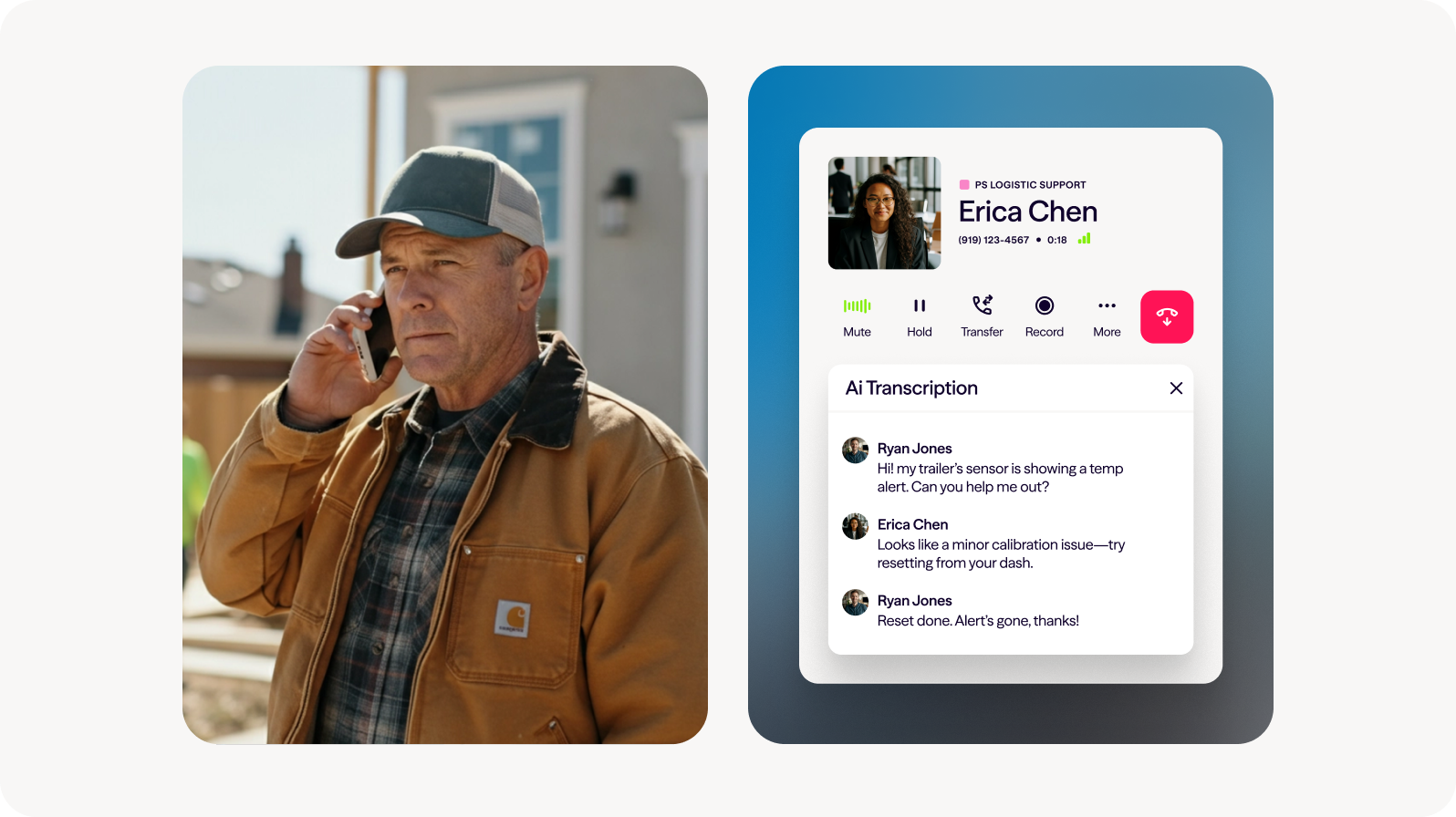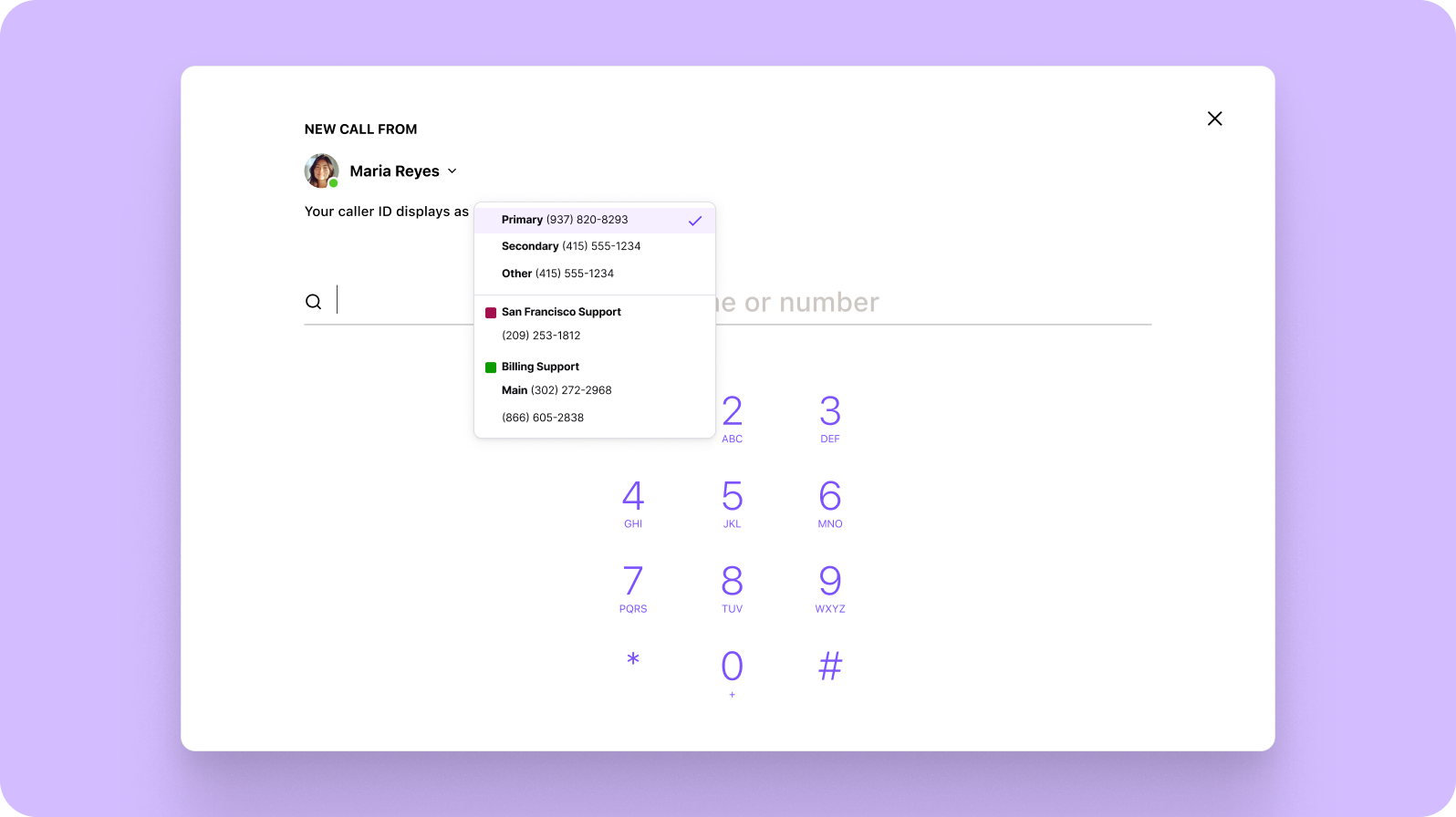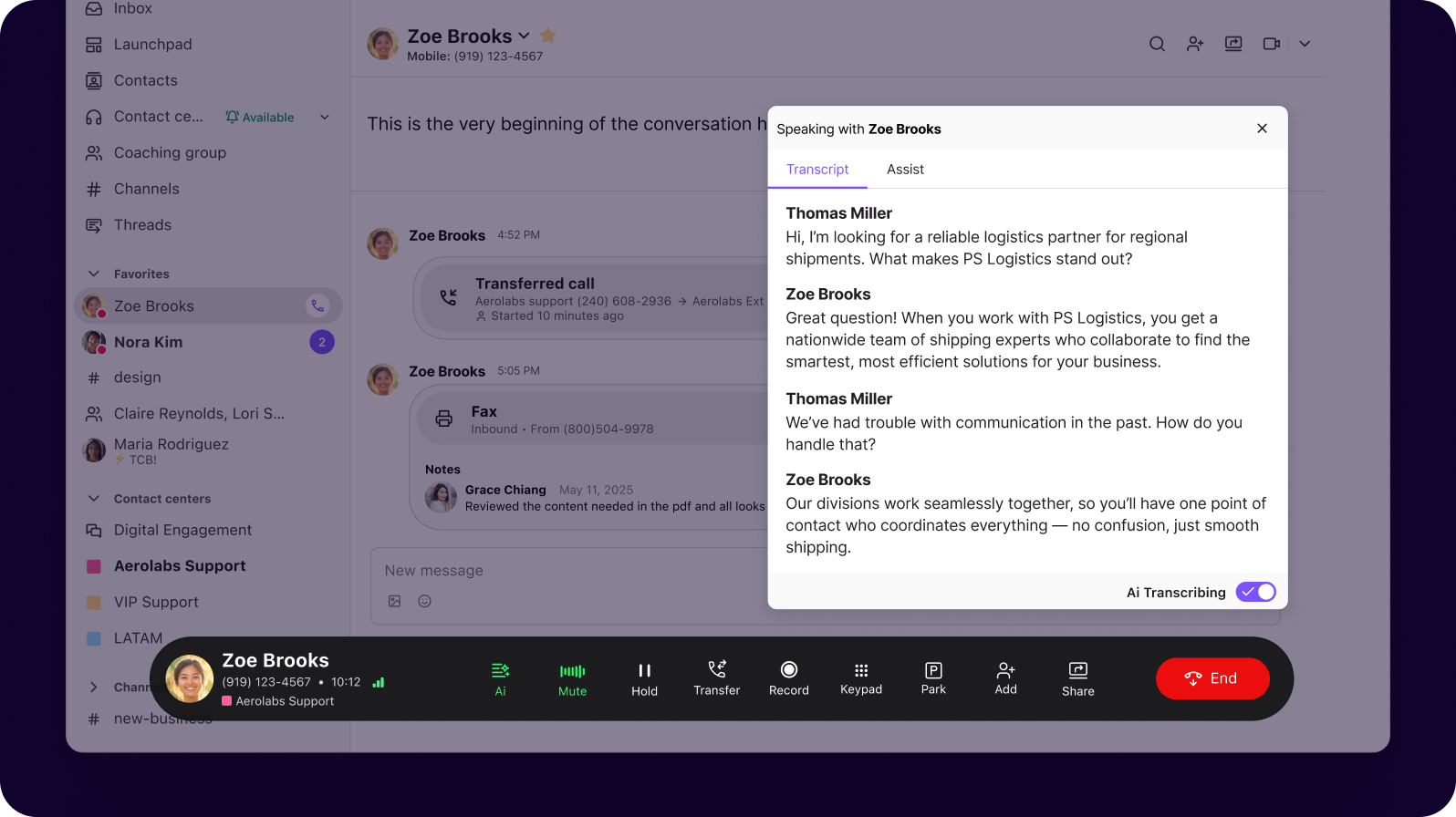PS Logistics' AI transformation: From phone system chaos to 50% retention rates

PS Logistics operates nearly 5,000 trucks across America's highways, keeping the nation's supply chain moving 24/7. Based in Birmingham, Alabama—a crucial logistics center where Interstate highways converge—this holding company manages 16 different operating entities, from P&S Transportation, the original flatbed carrier that started it all, to TA Services on the brokerage side, to specialized fleets handling everything from 53-foot trailers to owner-operator services.
At its core, PS Logistics is built on relationships that are strengthened at truck stops, dispatch centers, and roadside conversations. Drivers depend on breakdown coordinators who understand their routes and equipment. Recruiters connect with prospects across the country, often talking for hours about life on the road. Customers rely on load planners and service teams who know their specific shipping needs.
PS Logistics’ operations spans flatbed carriers, brokerage, third-party logistics, and fourth-party logistics services—which contribute to creating economies of scale that help each operating company succeed
For PS Logistics’ VP of Technology Mauricio Paredes, who's been with the company for 13 years, this growth story brings both an opportunity and a complex operational challenge. "I joined when we were about 500 trucks. Now we're close to 5,000," he reflects. "It's been a challenging 13 years."
That growth came through both organic expansion and strategic acquisitions, each bringing new capabilities—and new communication complexities. As PS Logistics grew from a single carrier into a diverse family of companies, maintaining the reliable, personal service that drivers and customers expect became increasingly difficult.
At a glance: PS Logistics’ journey with Dialpad
Challenge: Phone system chaos across 16 acquired companies with different carriers and PBX systems, threatening driver support and creating operational inefficiencies.
Key outcomes:
50% driver retention rate vs 80-100% industry average
Eliminated weekly Saturday morning phone system checks
30-minute new hire training vs. hours previously
Seamless 24/7 operations across all subsidiaries
Unified recruiting standards driving better hire rates

Communication issues, costly downtime, and stranded drivers
Behind PS Logistics' impressive expansion from 500 to 5,000 trucks lies a story that many growing companies in America's heartland know well: success that outpaces systems.
Each of those trucks represents a driver who depends on reliable communication—whether they're calling in from a breakdown on a remote stretch of I-40, checking in with dispatch from a truck stop, or coordinating a complex delivery in an unfamiliar city. When communication fails, real people face real consequences.
When PS Logistics expanded through acquisitions, each new company brought its own communication infrastructure. "As we grew so large and sometimes by acquisitions, we kept collecting all these different phone systems and all the different relationships with different phone carriers," Mauricio explains.
What started as a manageable setup for a regional carrier quickly became unwieldy. "Whenever we acquire somebody, we would bring their phone system into the mix, and it just grew complex fast."
The operational impact hit immediately. Cost control became nearly impossible with multiple carrier relationships and billing systems. Call quality varied wildly depending on which aging system handled the connection.
Most telling was the weekly ritual that revealed just how fragile their communication infrastructure had become: on Saturdays, the entire team gathered for a conference call with one primary agenda item—to confirm that on-call staff had functioning phones.
"We used to get on the phone call every Saturday at 8:00 AM just to make sure that everybody that was gonna be on call that weekend had working phones," Mauricio recalls.
When drivers break down on weekends in remote locations, they need immediate support. When maintenance coordinators can't be reached because of phone system failures, a minor mechanical issue turns into hours of costly downtime and a stranded driver.
The human cost was clear: drivers waiting longer for help, recruiters struggling with inconsistent tools, and support staff spending more time managing technology than helping people.
Not just a vendor—but a clear, winning partner
When PS Logistics began evaluating communication solutions, they knew exactly what they needed: a platform that could handle their complex operations while being able to grow with them into the future.
"We wanted AI, we wanted call centers, we wanted instant transcription," Mauricio explains. These were essential capabilities for managing 5,000 drivers and multiple operating companies efficiently.
Rather than navigate the vendor landscape alone, PS Logistics worked with a partner to help narrow their options and understand what was available. The partner conducted a thorough investigation of their needs, then presented solutions that could meet their specific requirements. This collaborative approach proved crucial—it helped them focus on platforms that could deliver real value rather than getting lost in feature lists and sales pitches.
The evaluation process quickly revealed a key insight: PS Logistics didn't want separate solutions for different functions. They needed one platform that could handle regular calls and contact center operations seamlessly.
"We didn't want to have separate call centers, we didn't want to have one client for the regular caller and a different client for the call center participants," Mauricio notes. The goal was simple—upgrade a license and unlock new capabilities, not force employees to learn entirely different systems.
This unified approach led them directly to Dialpad. "When you start looking at all those features, Dialpad certainly comes to the top as the vendor and partner to have," Mauricio reflects.
Making every call count with AI Intelligence
Before Dialpad, managing phone menus for more than 10 companies had become unwieldy and time-consuming. Drivers faced lengthy menu trees just to reach the right department, which proved frustrating when they needed immediate assistance.
Now, this operational weakness has become one of PS Logistics’ most transformative outcomes, thanks to Dialpad’s caller ID recognition that instantly connects drivers to the right support team. For drivers calling in from truck stops or remote highways, this seemingly small change eliminated a major source of delay and frustration. Drivers now reach the right support 100% of the time with intelligent call routing.

"Now the driver really has to do nothing. They call in. We look at the caller ID and we say, okay, well this is a Blair driver. We present it to that maintenance group first," Mauricio explains.
The system recognizes which company each driver belongs to and routes them directly to maintenance coordinators who understand their specific equipment, routes, and operational procedures.
This intelligent call routing creates meaningful human connections at scale. When a Blair Logistics driver calls with a breakdown, they're connected to maintenance specialists familiar with Blair's fleet and processes. P&S Transportation drivers reach P&S maintenance teams who know their trucks and typical routes.
While all teams back each other up during high-volume periods, the preference system ensures drivers get specialized support from people who understand their specific situation.
McLeod integration: Every second counts on the road
PS Logistics found one of their biggest efficiency gains in the ability to make calls directly from their McLeod TMS. Coordinators save hours weekly by making calls directly from their transportation management system, eliminating the friction that slows down critical workflows.
"Basically what the McLeod integration allows us to do is anywhere on our TMS that there's a phone number you can right click and dial," Mauricio explains.
Whether recruiters are working through prospect lists, maintenance coordinators need to reach drivers, or customer service teams are following up on shipments, every phone number becomes clickable. No more switching between applications, copying numbers, or risking dial errors.
The integration works both ways. When calls come in, Dialpad recognizes the caller ID and automatically presents relevant information from McLeod. "When you're in the incoming call, you will also recognize the caller ID and it gives you a couple of buttons that you can use to easily open the screens that are related to that call," Mauricio notes.
A driver calling in instantly pulls up their master record. A customer inquiry immediately displays their account information. The context that used to require searching and clicking is now available with a single button.
What makes this integration particularly valuable is how seamlessly it deployed. "This is actually McLeod led. So you can go to McLeod and say, ‘Hey, I want the telephony integration.’ And then the next question they're gonna ask you is what vendor you wanna integrate with? And you just tell 'em, Dialpad." The setup required creating an API key and associating users with their Dialpad numbers, but no complex IT project or extended downtime.
The real measure of success came in what PS Logistics didn't hear. "I don't think anybody will send me an email and say, 'Hey, this saves me hours,' but they will surely send me an email if it's not working," Mauricio observes.
Standardizing recruiting success across 16 companies
Recruiters achieve consistent quality across all companies with AI-powered coaching that standardizes their approach and improves hire rates. With 16 different operating companies, each with their own history and trucking culture, maintaining consistent recruiting quality presented a unique challenge for PS Logistics.
How do you ensure every potential driver receives the same level of professional service, whether they're speaking with a recruiter from P&S Transportation or Blair Logistics?
Dialpad's Ai features provided the answer. "What we've done on recruiting is used Dialpad to try to standardize how all our companies do recruiting," Mauricio explains.
Through real-time transcription, coaching scorecards, and CSAT scoring, PS Logistics created a unified guideline that spans all their recruiting efforts. “With Dialpad’s transcripts, coaching, and scorecards, we’ve enabled our recruiters to follow a standard."

24/7 support when drivers need help most
Breakdown coordinators follow safety protocols 100% of the time with AI coaching that provides real-time guidance during high-stakes roadside emergencies. When a truck breaks down on a remote highway at 3 AM, every minute counts.
PS Logistics' breakdown coordinators are the critical lifeline between stranded drivers and getting back on the road safely. These specialists handle everything from mechanical failures to route changes—working around the clock to support drivers who can't afford extended downtime.
Dialpad's AI coaching cards ensure these high-stakes conversations follow proper protocols every time. When a coordinator mentions tire issues, the system automatically displays process reminders for selecting the right vendor and tire specifications. If a driver reports an accident, a coaching card immediately appears with clear instructions: "This needs to go to risk immediately," ensuring the call gets transferred to the risk management team without delay.
This automated process enforcement is critical for both safety and compliance. "We take every accident very seriously. So there is a team that is in charge of that," Mauricio explains. The AI coaching cards eliminate human error in these critical moments—coordinators can't forget procedures or claim they didn't know the process when the system provides real-time guidance.
The combination of company-specific routing and AI-powered process enforcement creates a support system that's both personal and professional. Drivers get help from coordinators who understand their specific equipment and routes, while coaching cards ensure every interaction follows PS Logistics' safety standards and operational procedures.
The numbers don’t lie
The logistics industry is notorious for high turnover—where drivers often hop between carriers chasing better pay or treatment. Despite this, PS Logistics has achieved something remarkable: genuine driver retention.
"We have one of the highest retention rates in the industry. I mean, our turnover is in the low fifties, which is for a trucking company, it's a big deal. You know, some people run 80, 90, even a hundred," Mauricio explains.
While competitors struggle with turnover rates that can reach 100%, PS Logistics maintains a retention rate that's nearly twice the industry standard.
The connection between communication quality and retention isn't lost on the leadership team. "And we think all that's got to do with proper communication," Mauricio notes. When drivers can reach the right support person immediately, when breakdowns get resolved quickly, and when every interaction feels professional and efficient, it creates the kind of work environment that keeps experienced drivers on the team.
New employees save 90% of their training time on phone systems, focusing on job skills instead of wrestling with technology. What once took hours focused on navigating complex phone systems now requires just 30 minutes on Dialpad basics.
"Dialpad is simple enough that they just spend half an hour and they understand how to use it," Mauricio observes. This allows training to focus on job-specific skills—learning routes, understanding equipment, and building relationships with drivers.
The largest transformation? Eliminating those Saturday morning phone checks. "I can't remember the last time somebody said, 'Hey, I'm having phone issues.' Unless they're having internet issues, we then go, okay, well use the app on your cell phone," Mauricio reflects.
Growing together beyond just technology
For PS Logistics, the relationship with Dialpad extends far beyond a typical vendor arrangement. Mauricio's advice to other companies is straightforward: "Look for a partner, not just a vendor."
The difference lies in having someone who listens to your needs and stands by you when issues arise—something particularly important in the transportation industry, where solid relationships and reliability matter most.
This partnership approach manifests through PS Logistics' participation in Dialpad's Customer Advisory Board, where they help shape the platform's future alongside other enterprise customers. The collaboration allows them to see upcoming features early and plan processes accordingly, rather than reactively adapting to changes.
What makes Dialpad unique is its commitment to continuous evolution. "It's something that evolves... it's a true SaaS offering," Mauricio explains. Unlike traditional phone systems that remain static for years—a common frustration in the transportation industry where technology often lags behind operational needs—Dialpad regularly introduces new capabilities that grow alongside their business requirements.
Looking ahead, PS Logistics is excited about expanding Dialpad's AI capabilities, particularly integrating customer knowledge bases with call transcripts for more contextual support. This represents "People-first AI"—technology that enhances human judgment rather than replacing the experienced coordinators and recruiters who understand the nuances of trucking culture. For PS Logistics' 5,000 drivers and support teams, Dialpad ensures every call connects people to the help they need, when they need it most.
Ready to build authentic relationships at scale?
Vee how Dialpad's AI-powered communications platform helps transportation companies maintain personal connections with thousands of drivers while streamlining operations across multiple subsidiaries.



